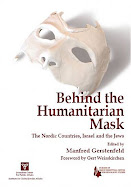One helluva woman - Psychiatrist Wafa Sultan knows first hand what she is talking about.
The irrationality of the islamic ideology is indeed insanity in itself
More on the muslim psyche by Shrinkwrapped who is a psychiatrist and do psychoanalysis - Extract from his excellent analysis The Arab Mind archive.
Narcissism and Honor-Shame Dynamics
The intersection of the Arab child rearing practices that I have been describing and Arab culture is nowhere so clear as in the Honor-Shame dynamics which dominate Arab culture today. Honor-Shame is nothing less than the summation of the pathological narcissism that Arab child rearing engenders.
Whether discussing sexual play with boys, the instant gratification afforded pre-Oedipal boys, the mirror image deprivation afforded young girls, or the sudden change for the boy to a posture of submission enforced by physical abuse, the consistent underlying pathological feature is a disrupted empathic connection between the parent and child. The young boy who is always gratified does not develop the necessary ability to tolerate reasonable frustration; at the same time he develops an exaggerated sense of self, a grandiose self. The young girl who is deprived of gratification develops a deeply impaired and damaged self, what has been called in its extreme form "soul murder" and what in more attenuated forms can evidence as poor self-esteem. In the cases of extreme gratification and extreme deprivation, the parent responds to their own designs and needs as opposed to the Western ideal of responding to the child's infantile needs. Such needs include a deft dosage of deprivation and a reasonable amount of gratification; at the extremes, narcissistic vulnerability is the result.
Deficits in parental empathy are instrumental in developing narcissistic pathology. Dr. Sanity has described the developmental lines of Narcissism in her excellent series on Narcissism and Society. She points out the need for the healthy character to integrate the parallel lines of grandiose self and the idealized parental image which originally emerge from the fused self/object symbiosis of the early Mother/infant dyad:
It is because of the slow separation of Self from Other that the two developmental lines come into being. The first line (Heinz) Kohut refers to as the “Grandiose Self”(or idealized self image) and the second is referred to as the “Idealized Parent Image”. Both of these images represent psychological attempts to save the original experience of "perfection" by the infant when the Mother (Other) and the infant (Self) were “one”.
The “Grandiose Self” will develop over time (if not disrupted) into healthy Self-Esteem; and the” Idealized Parent Image” will eventually lead to the development of Ideals that give meaning to the individual’s life; and to healthy interpersonal relationships.
The psychological developmental lines of Narcissism is a difficult concept; I urge you to read her series (Part I, Part II, Part III) as well as my series on Narcissism, Malignant Narcissism, and Paranoia (Part I, Part II, Part III, Part IV) to gain a better understanding of the concept. For the purposes of this series, suffice to point out that Arab child rearing practices seem ideally suited to the development of Narcissistic pathology. This has important implications for Arab culture and there are two especially significant features worth emphasizing. However, one more aspect of Narcissism must be considered before expanding the discussion to include the Honor-Shame dynamic.
In Narcissism, Malignant Narcissism, and Paranoia: Part III, I described the inner poverty of the Narcissist who had grown up in a relatively non-empathic, emotionally deprived, environment and his need for others to act as "need satisfying objects."
One of the outcomes of this kind of family and environmental (emotional) impoverishment is that such children grow up with minimal reserves of self esteem. They don't feel valued and the need to fend off despair requires them to find ways for the environment (the other) to support their self esteem. Other people become important props who can buttress or threaten their self esteem. (Think again of the “gangsta” who "demands" respect; if he is feared and respected, he is powerful and safe; once the fear is gone, he trembles. We see this at work on a larger scale in Afghanistan, the Ukraine, Iraq, now Lebanon and Syria, perhaps Egypt and Saudi Arabia; once the people are no longer afraid of the tyrants, the system can not long be maintained.) Other people are not related to as independent people (objects or selves, in analytic terms) who have their own desires and emotional lives, but as "need satisfying objects" whose sole purpose is to enhance the self esteem of the damaged one. In mild forms, this can lead to people who literally cannot conceive of another person's mind working differently from their own. We all know people who insist that “everyone cheats”; since they cheat (and justify their cheating by rationalizing that everyone else does it, too) they cannot believe that you might not cheat, if faced with the opportunity.
In more severe cases, the existence of the other person’s mind and life is simply of no consequence. For the Malignant Narcissist, other people are mere props in the pageantry of their lives. A tyrant can throw someone into a shredding machine without a second thought because the victim only matters in relation to how he can support the grandiosity of the tyrant; beyond that, he is faceless, nameless, worthless. It was no accident that Saddam Hussein was surrounded by sycophants who all grew mustaches to look just like him.
Continue reading Narcissism and Honor-Shame dynamics.
Thursday, November 20, 2008
Wafa Sultan: Its impossible to believe in Islam & be sane
Posted by
Rolf Krake
at
Thursday, November 20, 2008
![]()
Subscribe to:
Post Comments (Atom)
































No comments:
Post a Comment